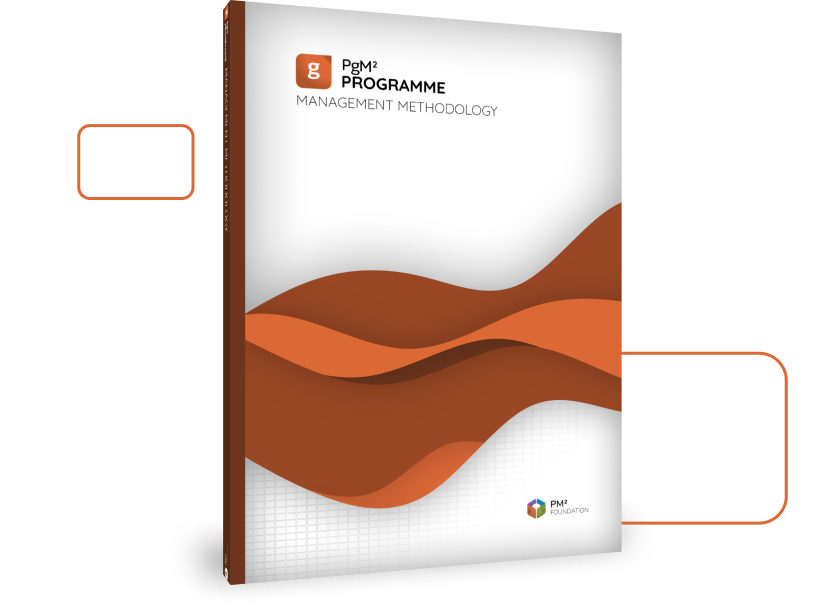

PgM² Programme Management
The PgM² Programme Management Guidelines presents an effective standalone methodology which aims to enable Organisations to deliver solutions and benefits to their stakeholders through the effective management of strategic initiatives which have been initiated as programmes.
It provides a management approach which is compatible with Projectised, Matrix and Functional Organisations.
Programme Management Guide
Open source Programme Management for your organisation's programmes.
Open access to resources
Download, use freely and share the valuable and out-of-the-box usable PgM² resources.
Become a PgM² Expert
Get trained to become a Programme Management Consultant or Expert.
PgM² Overview
The purpose of the PgM² Programme Management Methodology is to enable Organisations to deliver solutions and benefits to their stakeholders through the effective management of strategic initiatives which have been initiated as programmes.
PgM² provides organisations with the management methodology required for the effective undertaking of programmes. It provides a management approach that is compatible with Matrix and Functional Organisations particularly when (but not limited to) their projects are managed with the PM² Methodology.
PgM² Programme Management enables the effective coordination of programmes and the achievement of outcomes.
PgM² is part of the Squared Methodologies Suite and therefore aligned with the suite’s philosophy of being an open, effective, and lean methodology that organisations can further tailor to their specific needs. PgM² incorporates elements from a wide range of globally accepted programme management best practices, as well as operational experience from within the European Union Institutions and other organisations and contributions from the open community.
The PgM² Methodology provides:
- a programme governance structure.
- a programme lifecycle.
- guidelines for programme management activities.
- programme artefact templates.
- guidelines for using the artefacts.
- a set of effective mindsets.
Programme governance is the framework within which programme management decisions are made. It defines all programme roles and their associated responsibilities.
The programme management Roles are essentially defined by the management responsibilities given to them, whereas responsibilities describe what each role needs to be concerned with, their domain of (management) work and level of authority.
All programmes have a beginning, a middle and an end. Since programmes can last for a long time, it is useful to slice their total timespan into smaller periods of time called Phases. This slicing is done based on the common characteristics of the management activities executed during that period.
In other words, the PgM² Phases group related programme management activities and help the programme teams focus on the phase activities and their objectives.
The PgM² Methodology defines a number of management activities which are to be executed throughout the programme lifecycle. Through the execution of these activities, Programme Managers (PgMs) can apply commonly accepted programme management best practices that help them achieve their programme management objectives.
PgM² presents a wide range of such activities along with guidelines on their application. These guidelines describe the activities (what) and their purpose (why), they present the distribution of the responsibilities for their execution (who), indicate the timing of their execution and their frequency for recurring activities (when), and provide guidelines for their execution (how).
Documentation in programmes is an essential enabler for effective initiating, planning, executing, monitoring & controlling and finally closing a programme.
The PgM² Methodology proposes the creation of a set of Artefacts that facilitate the definition, management and communication of programmes. PgM² offers a complete set of programme templates and detailed guidelines on how to use them.
The PgM² Mindsets are the glue that holds the PgM² pillars together. They provide a common set of beliefs and values for all programme management practitioners. They are the attitudes and behaviours that help organisations and teams navigate the complexities of managing programmes and make the PgM² Methodology both more effective and complete.
Learn more about the PgM² Programme Management Methodology by downloading the Guide and reading the articles in the PgM² Library.

Nicos Kourounakis
MASc, MBA, PMP, PM²
The Author
Nicos Kourounakis is a Management Consultant, Trainer and Author with over 20 years of experience in international projects, working both with large organizations as well as with smaller ventures and start-ups.
Over the past 10 years, he has been leading consulting projects at major EU Institutions such as the European Commission, the European Parliament, the European Council, the European Central Bank, the European Investment Bank, and several EU Agencies.
Nicos is the Author of the PfM² Guide for Portfolio Management (December 2021) and the PgM² Guide for Programme Management (March 2022), the PM² Methodology of the European Commission (2018) and other publications.


